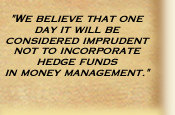March 9, 2009 – New York, NY – Hennessee Group LLC, a consultant and adviser to direct investors in hedge funds, announced today that the Hennessee Hedge Fund Index declined -0.78% in February (+0.12% YTD), while the S&P 500 declined -10.99% (-18.62% YTD), the Dow Jones Industrial Average declined -11.72% (-19.52% YTD), and the NASDAQ Composite Index declined -6.68%
(-12.63% YTD). Bonds also declined, as the Barclays Aggregate Bond Index declined -0.38% (-1.26% YTD).
“Hedge funds are off to a good start in 2009,” commented Charles Gradante, Co-Founder of Hennessee Group. “Hedge funds were flat the first two months of the year, while equity markets have declined almost -20%. Hedge funds are doing what they do best, preserving capital in down markets and generating alpha by managing exposures and perceptive stock selection.”
“We are encouraged by the positive performance after a challenging 2008,” said Lee Hennessee, Managing Principal of Hennessee Group. “Conditions have improved for hedge funds. Volatility is elevated, but not extreme; dispersion among sectors and securities has increased; and the markets are responding to fundamentals (though negative fundamentals), which is allowing funds to generate profits in their short books.”
The Hennessee Long/Short Equity Index declined -1.09% in February (-0.25% YTD). The broad equity markets plummeted again in February, breaking through key technical levels and reaching prices not seen since 1997. Fears that the government would need to take over a significant portion of the U.S. banking system led investors to dump risk assets. Fundamentals continued to deteriorate as U.S. GDP contracted -6.2% in the fourth quarter, its weakest report since 1982. Hedge funds outperformed on a relative basis, but gave back most of January’s gains and are essentially flat for the year. While managers remain conservatively positioned with historically low gross exposures, some have started to slowly increase gross exposure as markets are trading more fundamentally. Managers are generally maintaining very tight net exposures with many managers neutral or net short. The majority of gains this year have been driven by short positions, especially in financials, consumer discretionary and industrial sectors. Several managers (especially healthcare and biotech managers) were hurt by their long healthcare exposure when President Obama released his budget proposal at month end, which called for spending cuts and healthcare reform. A sharp reversal and a broad based sell off in healthcare stocks occurred in the last couple days of the month.
“We are increasingly seeing long/short equity managers starting to build long credit positions. Many state that they are seeing opportunities in corporate and high yield credit to produce equity like returns with less risk,” said Charles Gradante. “The pervasiveness of this credit theme in long/short equity portfolios is probably the most prevalent theme since we saw long/short equity funds buying credit default swaps (CDS) back in 2006. The CDS trade turned out to be one of the best performing trades for equity funds in 2007.”
The Hennessee Arbitrage/Event Driven Index gained +0.05% in February (+2.44% YTD). Arbitrage/Event Driven strategies have outperformed long/short equity and global/macro strategies thus far this year after a very challenging 2008. The Hennessee Distressed Index declined -0.02% in February (+1.82% YTD), as the spread on the Merrill Lynch High Yield Index widened from 1626 basis points to 1638 basis points during the month. A two month rally in high yield credit ended in February as the Merrill Lynch High Yield index declined -3.5% (+1.7% YTD), giving back some of its January gains. The Hennessee Merger Arbitrage Index advanced +0.24% in February (+0.84% YTD). Many managers state that spreads are attractive as there is less competition in merger arbitrage. However, many maintain a negative outlook on the strategy as M&A activity has fallen dramatically due to the credit crisis. Most managers are focusing on smaller, strategic cash deals in order to generate gains. The Hennessee Convertible Arbitrage Index advanced +0.72% (+5.91% YTD). Managers generated gains from a richening in the secondary market and from their positive carry. The gains were offset by losses attributed to a slight tightening of credit spreads and an increase in interest rates.
“We are still seeing a negative overhang from large hedge funds that imposed gates on redemptions. We expect them to continue selling to raise cash for redemptions,” said Charles Gradante. “However, we are also seeing some creative ways for investors to gain liquidity from gated funds. Most notably, there have been a series of auctions where investors can purchase fund interests in the secondary market at a discount to NAV. This process benefits limited partners as it gives them immediate liquidity. It also benefits the fund as it eliminates the need to sell securities to fund redemptions. Hennessee Group strongly supports this activity since it provides liquidity during periods of illiquidity.”
The Hennessee Global/Macro Index declined -0.96% in February (-1.50% YTD). International equities declined sharply in February as investor’s risk aversion increased, with the MSCI EAFE Index declining -10.54% (-19.38% YTD), in parallel with U.S. markets. The Hennessee International Index declined -1.66% (-0.86% YTD) as managers remained conservative with low gross exposures and reduced risk. The Hennessee Macro Index declined –1.62% for the month (-1.05% YTD). Macro managers posted gains on gold as prices increased from $913 to $939 per troy ounce during the month. Gold flirted with $1000, but sold off at month end due to profit taking. Managers also posted gains shorting long-term Treasuries, as many expected yields to increase. The yields on long term Treasuries increased approximately 13 basis points, with the 30 year increasing from 3.58% to 3.71%. Managers lost money through their long exposure to U.S. and global equities after many increased exposure thinking equities were oversold.
“Many macro managers are betting that long term U.S. interest rates will increase over the next 18 months,” said Charles Gradante. “However, the U.S. government needs to keep rates low, especially the 10 year (used to set mortgage rates) in order to eventually provide stability to the housing market. We may see the U.S. government buying Treasuries to affect low rates… however, this would lead to some serious long term issues.”
Charles Gradante also stated, “Other issues plaguing the global markets are the levels of “external foreign” debt to GDP, which has already taken its toll on Iceland.” (See Hennessee Group white paper: Is This the Tip of the Iceberg?)
About the Hennessee Group LLC
Hennessee Group LLC is a Registered Investment Adviser that consults direct investors in hedge funds on asset allocation, manager selection, and ongoing monitoring of hedge fund managers. Hennessee Group LLC is not a tracker of hedge funds. The Hennessee Hedge Fund Indices® are for the sole purpose of benchmarking individual hedge fund manager performance. The Hennessee Group does not sell a hedge fund-of-funds product nor does it market individual hedge fund managers. For additional Hennessee Group Press Releases, please visit the Hennessee Group’s website. The Hennessee Group also publishes the Hennessee Hedge Fund Review monthly, which provides a comprehensive hedge fund performance review, statistics, and market analysis; all of which is value added to hedge fund managers and investors alike.
Description of Hennessee Hedge Fund Indices®
The Hennessee Hedge Fund Indices® are calculated from performance data reported to the Hennessee Group by a diversified group of over 1,000 hedge funds. The Hennessee Hedge Fund Index is an equally weighted average of the funds in the Hennessee Hedge Fund Indices®. The funds in the Hennessee Hedge Fund Index are derived from the Hennessee Group’s database of over 3,500 hedge funds and are net of fees and unaudited. Past performance is no guarantee of future returns. ALL RIGHTS RESERVED. This material is for general information only and is not an offer or solicitation to buy or sell any security including any interest in a hedge fund.












